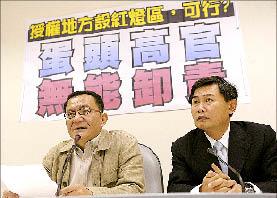The Alliance against Sexual Exploitation yesterday urged the government to put to a referendum a plan by the Ministry of the Interior to legalize prostitution in designated areas.
“We are opposed to making prostitution an industry and a job, because the sex trade is essentially exploitation of the female body,” Lee Li-fen (李麗芬), secretary--general of End Child Prostitution in Asian Tourism Taiwan, one of the alliance’s member groups, told a news conference at the legislature yesterday morning.
“The ministry is trying to shirk its responsibility by saying it respects local governments and authorizing them to decide whether to create prostitution zones in their city or county,” Lee said. “If the ministry really cares about what local residents think, they should put the issue ... to a referendum.”

Photo: George Tsorng, Taipei Times
Taiwan Women’s Link secretary-general Tsai Wan-fen (蔡宛芬) said that creating red light districts would not resolve social issues related to the sex industry, such as crime.
Taipei Women’s Rescue Foundation executive director Kang Shu-hua (康淑華) said if the government cared about economically disadvantaged women’s right to work, it should come up with other solutions.
“Rather than legalizing the sex industry to open [work opportunities] for the economically disadvantaged, as government officials have put it, the ministry should come up with actions to improve women’s welfare and ameliorate employment conditions for women,” Kang said. “Allowing women to sell their bodies isn’t helping.”
The ministry announced on Wednesday that after a clause in the Social Order Maintenance Act (社會秩序維護法) banning prostitution expires in November, it would allow local governments to set up special districts in which the sex trade would be permitted, while selling or buying sex services outside those areas would be prohibited by law.
The policy has drawn sharp criticism from groups that support and oppose the legalization of the sex industry, with one side saying the measures are too restrictive, while the other said the sex industry should not be legalized at all.Economically disadvantaged women need jobs, but not sex jobs,” Democratic Progressive Party Legislator Huang Sue-ying (黃淑英) said. “The sex industry neither satisfies the needs of economically disadvantaged women, nor does it protect the rights of sex workers. It only satisfies men’s desires.”
Huang has proposed legislation penalizing clients, rather than the service provider, in the sex trade.

Chinese Nationalist Party (KMT) Chairman Eric Chu (朱立倫), spokeswoman Yang Chih-yu (楊智伃) and Legislator Hsieh Lung-chieh (謝龍介) would be summoned by police for questioning for leading an illegal assembly on Thursday evening last week, Minister of the Interior Liu Shyh-fang (劉世芳) said today. The three KMT officials led an assembly outside the Taipei City Prosecutors’ Office, a restricted area where public assembly is not allowed, protesting the questioning of several KMT staff and searches of KMT headquarters and offices in a recall petition forgery case. Chu, Yang and Hsieh are all suspected of contravening the Assembly and Parade Act (集會遊行法) by holding

PRAISE: Japanese visitor Takashi Kubota said the Taiwanese temple architecture images showcased in the AI Art Gallery were the most impressive displays he saw Taiwan does not have an official pavilion at the World Expo in Osaka, Japan, because of its diplomatic predicament, but the government-backed Tech World pavilion is drawing interest with its unique recreations of works by Taiwanese artists. The pavilion features an artificial intelligence (AI)-based art gallery showcasing works of famous Taiwanese artists from the Japanese colonial period using innovative technologies. Among its main simulated displays are Eastern gouache paintings by Chen Chin (陳進), Lin Yu-shan (林玉山) and Kuo Hsueh-hu (郭雪湖), who were the three young Taiwanese painters selected for the East Asian Painting exhibition in 1927. Gouache is a water-based

Taiwan would welcome the return of Honduras as a diplomatic ally if its next president decides to make such a move, Minister of Foreign Affairs Lin Chia-lung (林佳龍) said yesterday. “Of course, we would welcome Honduras if they want to restore diplomatic ties with Taiwan after their elections,” Lin said at a meeting of the legislature’s Foreign Affairs and National Defense Committee, when asked to comment on statements made by two of the three Honduran presidential candidates during the presidential campaign in the Central American country. Taiwan is paying close attention to the region as a whole in the wake of a

OFF-TARGET: More than 30,000 participants were expected to take part in the Games next month, but only 6,550 foreign and 19,400 Taiwanese athletes have registered Taipei city councilors yesterday blasted the organizers of next month’s World Masters Games over sudden timetable and venue changes, which they said have caused thousands of participants to back out of the international sporting event, among other organizational issues. They also cited visa delays and political interference by China as reasons many foreign athletes are requesting refunds for the event, to be held from May 17 to 30. Jointly organized by the Taipei and New Taipei City governments, the games have been rocked by numerous controversies since preparations began in 2020. Taipei City Councilor Lin Yen-feng (林延鳳) said yesterday that new measures by